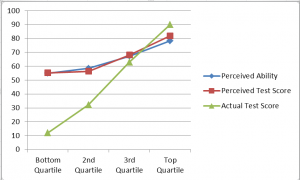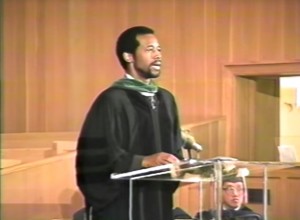Nov
10
2015
 This research was published in February of this year, but somehow I missed it when it came out. Fortunately, the internet never forgets, and the study is making the rounds again on social media, this time getting caught in my net.
This research was published in February of this year, but somehow I missed it when it came out. Fortunately, the internet never forgets, and the study is making the rounds again on social media, this time getting caught in my net.
The study is an examination of how we make decisions in groups, with the specific question of how we weight the opinions of different members of the group. The researchers studied pairs of subjects (which they call dyads) who were given a specific task, such as identifying a target in a photo they are able to briefly glimpse. Each member of the dyad registers their choice. If they disagree, then one member is chosen at random to be the arbiter. The question is – will the arbiter favor their own opinion, or that of their partner?
For each pair 256 trials were run, and after each one they were given feedback as to who was correct. The idea is that each member of the pair would learn who was performing better. In one experiment they were given a running tally, to make sure they knew who was performing better. In another the task was made more difficult for one partner, increasing the difference in their performance, and in a final experiment the pair was given a financial incentive to perform better.
Continue Reading »
Nov
09
2015
 I understand that fervent skepticism can sometimes be annoying, especially when it is aimed at something you believe or at least think is either likely or should not be ruled out. It’s as if the skeptics are trying to disprove your belief.
I understand that fervent skepticism can sometimes be annoying, especially when it is aimed at something you believe or at least think is either likely or should not be ruled out. It’s as if the skeptics are trying to disprove your belief.
Well, they are. That’s the point. Welcome to science.
Initial skepticism is a productive response to any new claim, and history bears that out. Often observations or even experimentation leads to the possibility of new phenomenon. Almost by definition this is based on a currently unexplained anomaly.
An anomaly is a phenomenon that does not fit with our current understanding of the universe. If we are encountering an entirely new phenomenon it is likely that what we are observing will be anomalous, because we can’t explain what we don’t know. In fact scientists love anomalies – they point toward new discoveries. Anomalies are where the action is.
Continue Reading »
Nov
06
2015
As a general rule of thumb, if a headline contains a question the answer is usually “no.” This headline is no exception.
Thanks to the low journalistic standards at the Daily Mail, an ESP proponent by the name of Diane Powell is getting another round of media attention for her claim that children with autism can have telepathic powers, which she feels is an evolutionary compensation for their otherwise limited ability to communicate.
The story revolved around a 5-year-old boy named Ramses Sanquino, whose mother believes is a savant as well as telepathic. I tend to be skeptical of specific savant claims, even though they are well documented in some cases. I don’t doubt the phenomenon, but I have also seen cases in which overzealous parents manufacture the perception of extraordinary abilities in their children.
I was even involved in a case in which a mother believed her young child, who was non-verbal, could read in two languages on a 10th grade level. She came by this determination through facilitated communication, which is not a legitimate technique. This was a clear case of projecting her hopes onto her mute and passive child.
Continue Reading »
Nov
05
2015
 By all accounts, Ben Carson is a brilliant pediatric neurosurgeon. He was the Director of Pediatric Neurosurgery at Johns Hopkins Hospital until he retired, and received the Presidential Medal of Freedom for his surgical achievements.
By all accounts, Ben Carson is a brilliant pediatric neurosurgeon. He was the Director of Pediatric Neurosurgery at Johns Hopkins Hospital until he retired, and received the Presidential Medal of Freedom for his surgical achievements.
Carson’s views have come under close scrutiny since he has become a presidential candidate and is closing in on the frontrunner position. Carson is a Seventh Day Adventist. He is a creationist who has stated that he believes Darwin came up with the idea of evolution because of Satan. He thinks the Big Bang is a “fairy tale.”
He famously suggested that those who believe in evolution have no basis for their morality, saying:
“Ultimately, if you accept the evolutionary theory, you dismiss ethics, you don’t have to abide by a set of moral codes, you determine your own conscience based on your own desires.”
This claim is transparently wrong, and discounts a vast and rich philosophical history of morality and ethics.
Continue Reading »
Nov
03
2015
 How one responds to legitimate criticism is a very good indication of their intellectual fortitude and integrity. I pay specific attention to whether or not they address the actual criticism, rather than attack a convenient straw man, and whether or not they acknowledge fair points on the other side. Intellectual discourse, which often contains pointed criticism, is critically important. It is how we work out big ideas and move forward.
How one responds to legitimate criticism is a very good indication of their intellectual fortitude and integrity. I pay specific attention to whether or not they address the actual criticism, rather than attack a convenient straw man, and whether or not they acknowledge fair points on the other side. Intellectual discourse, which often contains pointed criticism, is critically important. It is how we work out big ideas and move forward.
In a recent blog post on the HuffPo, David Katz launches into a fallacy-ridden attack on Science-Based Medicine, managing to entirely mischaracterize our position, despite the fact that our position has been exhaustively discussed on our blog and elsewhere. His post, Science and Medicine, Fools and Fanatics: The ‘Fluidity’ of Woo, contains the usual alternative medicine tropes draped in protests of his academic credentials. David Gorski has already responded over at SBM, and I would like to add to his analysis here.
David Katz first defends his infamous statement advocating that medicine should use a “more fluid concept of evidence.” He writes:
Colleagues and I proposed, based on years of wrestling with complex patients, many of whom, urgent medical needs still insufficiently addressed, had tried and exhausted all of the well-supported, conventional treatments, that evidence traversed 5 key considerations. Those include: what is known about a treatment’s safety; what is known about a treatment’s efficacy; how well those first two are known (i.e., the clarity of evidence); the patient’s preferences; and, importantly, the availability of other, untried treatments for the condition in question.
He argues that when science-based alternatives are exhausted, a caring clinician should consider treatments with a more “fluid” standard of evidence. Since he apparently did not understand our original criticism, I will spell it out carefully here.
Continue Reading »
Nov
02
2015
 A new device called Thync has been advertising quite extensively and this has prompted a number of questions to me about its legitimacy. The device is worn over the right temple and above the right eye and provides timed pulses of mild electrical stimulation. Their website describes the effects:
A new device called Thync has been advertising quite extensively and this has prompted a number of questions to me about its legitimacy. The device is worn over the right temple and above the right eye and provides timed pulses of mild electrical stimulation. Their website describes the effects:
A soothing neck massage. A splash of cold water. A kiss from someone you love. These are common examples of how nerves signal the brain to change the way you feel. Thync works in the same way using signaling programs we call Vibes.
The device appears to have two settings, one with calming vibes and the other with energizing vibes. Let’s take a look at the state of the science
Plausibility
The idea of using electrical stimulation, of either nerves, the skin, or of muscles, in order to affect nervous system function is reasonable. The nervous system is both a chemical and electrical organ system and its function can be modified with electrical stimulation.
Continue Reading »
 This research was published in February of this year, but somehow I missed it when it came out. Fortunately, the internet never forgets, and the study is making the rounds again on social media, this time getting caught in my net.
This research was published in February of this year, but somehow I missed it when it came out. Fortunately, the internet never forgets, and the study is making the rounds again on social media, this time getting caught in my net.









